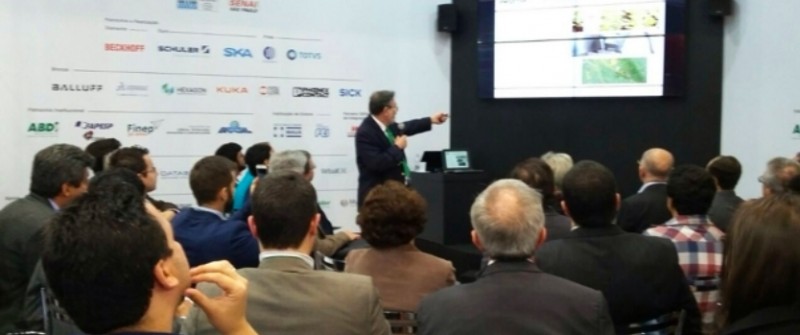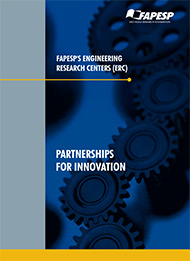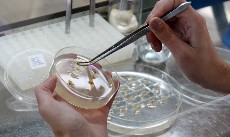FAPESP seeks partnerships to set up advanced manufacturing research centers

05 de julho de 2017
By Graça Mascarenhas | Agência FAPESP – FAPESP, the São Paulo Research Foundation, has issued a call for proposals for companies or consortia of companies that want to partner with it in establishing Advanced Manufacturing Engineering Research Centers.
The new research centers will develop factory optimization technologies and extend integrated automated applications throughout the value chain and product lifecycle.
“Advanced manufacturing is vitally important to the competitiveness of industry and its entire value chain,” said FAPESP CEO Carlos Américo Pacheco during the International Machine Tool & Industrial Automation Fair (EXPOMAFE) hosted by ABIMAQ, the Brazilian association of machinery and equipment manufacturers, as well as other industry associations.
Pacheco stressed that before deciding to set up the centers FAPESP had carefully studied worldwide developments in this field, taking a special interest in Germany’s Industry 4.0 program and advanced manufacturing initatives in the United States. FAPESP is in constant touch with Brazilian industry leaders and associations on this and other issues, he noted.
“Our decision was based on the irreversible needs of Brazil’s industry and our national development,” he said, adding that FINEP, the Brazilian Innovation Agency, and BNDES, the National Development Bank, are also expected to support the initiative in accordance with their own programs and practices.
Companies and consortia of companies interested in signing scientific and technological cooperation agreements to establish the centers have until August 8, 2017, to submit proposals to FAPESP, which will fund the centers under its Engineering Research Centers Program.
Any company or consortium that is selected will sign an agreement, and will then issue a joint call with FAPESP to select proposals from higher education and research institutions interested in hosting the Advanced Manufacturing Engineering Research Center.
The activities of each center will be funded for ten years by FAPESP, the selected company or consortium, and participating universities and research institutions. Partner companies will participate in the management of each engineering research center and periodically evaluate its R&D activities jointly with FAPESP.
In his presentation, Pacheco outlined the call for proposals and answered questions from the audience of some 60 industry executives and entrepreneurs. He stressed that interested companies or consortia should contact FAPESP to clarify doubts and schedule meetings, sending an email to manufatura.avancada@fapesp.br.
He also said technology parks will be able to help form consortia, as will ABIMAQ’s advanced manufacturing group, which will also be available to host meetings with interested companies.
Technological revolution
According to FAPESP President José Goldemberg, manufacturing processes underwent a technological revolution when electronic computing was introduced into factories the late twentieth century. “As a result certain industries, such as apparel and textiles, were dynamized and their classical production processes were eliminated, leading to the closure of many companies,” Goldemberg told Agência FAPESP.
Now, at the start of the twenty-first century, he added, another even deeper revolution is under way, involving not just computers but also robots and integrated collaborative automation systems that can be programmed to produce whatever is desired. This is advanced manufacturing, often known as industry 4.0, a reference to the fourth industrial revolution.
“If Brazil doesn’t participate in this new technological revolution, its industry will rapidly become obsolete. Hence the importance of investing in advanced manufacturing research centers,” Goldemberg said.
The call for proposals specifies a number of areas on which these research centers will be expected to focus, such as digitization technologies, cyber-physical systems (information and communications technology integarted with mechatronic systems to monitor industrial processes throughout the value chain), and additive processes such as 3D printing and hybrid manufacturing.
Other key areas of advanced manufacturing to be covered by the centers include robotics, development of sensors and trackers, the Internet of Things (IoT), advanced materials, artificial intelligence, augmented reality, predictive analytics, high-performance computing, and big data.
Carlos Henrique de Brito Cruz, FAPESP’s Scientific Director, underscored the importance of the centers. “FAPESP’s Engineering Research Centers Program permits research collaboration between private enterprise and universities and/or research institutions to carry out cutting-edge research for internationally competitive innovation,” he said. “The long-term nature of these projects, initially ten years, and integration between researchers in private enterprise and visiting researchers in universities or research institutions are drivers of genuinely collaborative research rather than mere service provision, expediting the utilization of results by partner companies and at the same time posing novel challenges in advanced research for the researchers and students involved. Few countries have programs of this kind.”
For João Alfredo Saraiva Delgado, ABIMAQ’s Technology Director, it is highly important to have research centers that support firms and work with them on R&D. “Funding R&D is difficult for the business community, especially small and medium firms. If these centers can link companies, startups and research institutions, it will be possible to be competitive and efficient,” he said.
Advanced manufacturing is a worldwide challenge, Delgado added. “Advanced manufacturing is the state of the art in industrial production processes. It’s so new that no one even knows what the new business models will be like. These centers will be at the forefront of research,” he said.
FAPESP already supports seven Engineering Research Centers, in partnership with Peugeot-Citroën, BG/Shell, GlaxoSmithKline (GSK) and Natura in biofuels, natural gas, green chemistry, drug molecules, and human well-being respectively. It recently also signed partnership agreements with Statoil and BG/Shell to establish two research centers, focusing on oil and gas reservoirs with the former and new energy carriers with the latter.
In announcing the call for proposals at EXPOMAFE, Pacheco emphasized the need to convert investment in science into innovation and cited FAPESP’s efforts in this direction, such as its Innovative Research in Small Business (PIPE) and University-Industry Cooperative Research (PITE), as well as the Engineering Research Centers Program.
FAPESP’s call for proposals to establish Advanced Manufacturing Engineering Research Centers can be read in Portuguese at fapesp.br/10988.



